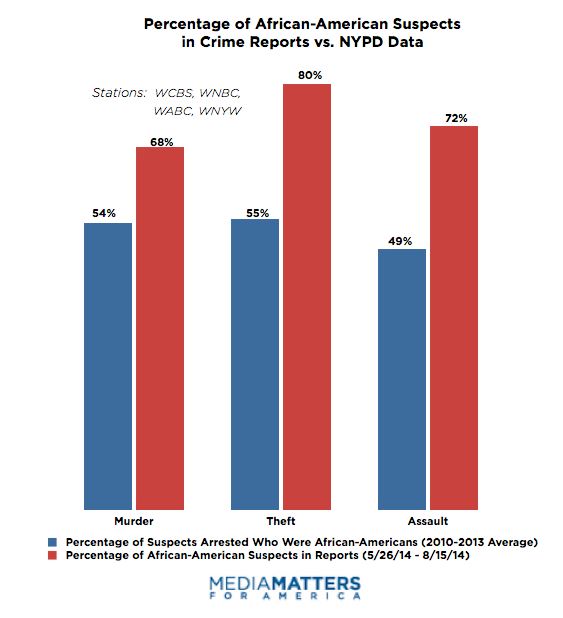A Media Matters analysis found that four major broadcast television stations in New York City gave disproportionate coverage to crime stories involving African-American suspects over the past three months. The stations' late-night news broadcasts on weeknights covered murder, theft, and assault cases in which African-Americans were suspects at a notably higher rate than the rate at which African-Americans have historically been arrested for those crimes in New York City.
REPORT: New York City Television Stations Give Lopsided Coverage To Black Crime
Written by Todd Gregory, Salvatore Colleluori & Daniel Angster
Published
Black Suspects Were Overrepresented In Newscasts On WCBS, WNBC, WABC, And WNYW
Coverage Of Cases Involving Black Suspects Outpaced Historical Arrest Rates From NYPD Statistics. In stories where race could be identified, the percentage of African-American suspects in murders, thefts, and assaults covered by WCBS, WNBC, WABC, and WNYW was well above the percentage of African-American suspects who have been arrested for those crimes in New York City. According to averages of arrest statistics from the New York City Police Department (NYPD) for the past four years, African-American suspects were arrested in 54 percent of murders, 55 percent of thefts, and 49 percent of assaults. Meanwhile, over the past three months, the suspects in the four stations' coverage of murders were 68 percent African-American, the suspects in their coverage of thefts were 80 percent African-American, and the suspects in their coverage of assaults were 72 percent African-American:

Coverage Of Black Suspects Varied Among Stations And By Crime
The table below shows the number of suspects who could be identified by race on each station and in each crime category, the number of those suspects who could be identified as African-American, and totals for each (click to enlarge):
Amount Of Crime Coverage Varied Widely Among The Four Stations
WABC Covered Crime The Most, While WNYW Covered It The Least. In the past three months, WABC reported on crime much more than the other three stations, with 154 suspects mentioned in its reports. The race of 98 of those suspects could be identified, 75 of whom were African-American. In contrast, WNYW mentioned only 38 suspects in its reports on crime. The race of 23 of those suspects could be identified, 19 of whom were African-American. WNBC aired the second-most coverage of crime, mentioning 105 suspects in its reports. The race of 82 of those suspects could be identified, 60 of whom were African-American. WCBS mentioned 80 suspects in its reports on crime. The race of 52 of those suspects could be identified, and 35 of them were African-American:

Methodology
Media Matters watched the late-night news on WCBS, WNBC, and WABC (airing at 11 p.m.) and WNYW (airing at 10 p.m.) during weeknights from May 26 until August 15. Media Matters recorded the race, if it could be determined, of suspects who were reported to be connected to crimes committed in New York City's five boroughs. Any story about a crime committed outside of the city limits was excluded. The race of the suspect was recorded only if it could be determined from a picture shown on the air or if the suspect's race was explicitly mentioned in the report. Any suspect whose race could not be determined was not included.
This data was then compared to data from the past four years of the New York City Police Department's “Crime and Enforcement Activity in New York City” report. Media Matters used numbers from the reports to calculate the amount of African-Americans arrested as a percentage of people with a known race who were arrested on the following charges:
- Murder and non-negligent manslaughter, for the category “murder”
- Robbery, petit larceny, and grand larceny, for the category “theft”
- Felony assault and misdemeanor assault, for the category “assault”
These categories represent the three most-covered crime stories on the four stations.
It should also be noted that during this period, a white police officer was involved in the death of Eric Garner, an African-American man. The data from that story was not included because Garner was not charged with any of the categories of crimes included in the report and because the police officer was not charged with a crime during the period of this report.
*The question of whether local television news programming over represents black men in its crime coverage is one that has been asked by academic researchers in the past (notably here and here).
